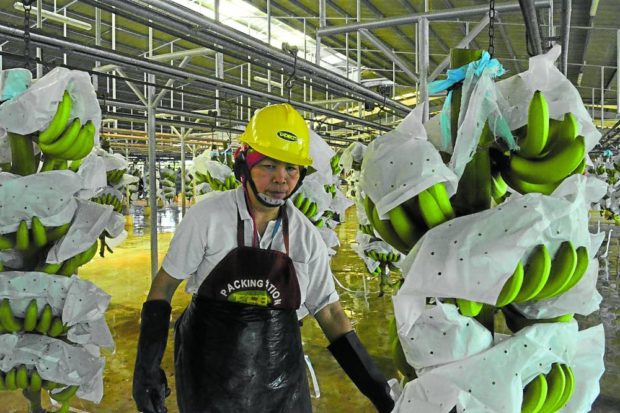
PACKING PLANT This 2016 photo shows a worker inside a packing plant of one of Davao del Norte’s top banana exporters. (GERMELINA LACORTE / Inquirer Mindanao
DAVAO CITY, Davao del Sur, Philippines — Some business leaders here batted for the lifting of the excise tax on oil products, instead of just providing subsidies for poor families, amid threats posed by the rising cost of fuel on Davao region’s multibillion-peso banana industry.
Lifting the oil excise tax would have been a better move for the government to cushion the impact of the skyrocketing oil prices triggered by the ongoing conflict in Ukraine, said Stephen Antig, executive director of Pilipino Banana Growers and Exporters Association, and Vicente Lao, chair of Mindanao Business Council.
“Eliminating the excise tax would … prevent the cost of produce from going up and inflation from rising,” Lao said in a text message to the Inquirer.
Top produce
Antig said the increase in prices of oil products had drastically impacted farm input costs, particularly in the banana industry, where the input cost of production had practically doubled.
“We are facing such a huge impact because freight and input costs have both gone so high,” Antig said in a text message.
The country’s banana export sector is still reeling from the COVID-19 pandemic, which badly affected the industry’s production and export receipts. From its $1.95-billion (roughly P97.5 billion) export receipts in 2019, the figures went down by 15 percent to $1.64 billion (P82 billion) during the 2020 pandemic year, according to the report of the Philippine Statistics Authority (PSA). From January to October last year, banana exports only registered $920 million (P46 billion).
In the July 2021 report of the PSA, the Davao Region contributed 36.8 percent of the country’s total banana exports; while Northern Mindanao and Soccsksargen (South Cotabato, Cotabato, Sultan Kudarat, Sarangani, and General Santos City) registered 22.7-percent and 12.7-percent share, respectively.
In Davao Oriental alone, 7,652 hectares tilled by over 9,000 farmers are dedicated to banana plantations, with an average production of 87,425 metric tons, the provincial government said on its website.
Good or bad idea
Antig said scrapping the excise tax instead of just giving subsidies to affected sectors would be a wiser move. “Where will the government get the funds for the subsidies when the industries have been saddled by deficits brought about by the COVID-19 pandemic?” he asked.
But Arturo Milan, regional governor of the Philippine Chamber of Commerce and Industry, defended the government’s move, even calling it “the better approach to the problem.”
“The scrapping of excise taxes is a bad idea as this will deprive the government of the needed revenue to pay off our ballooning debt due to COVID-19 response and will only benefit those who can afford the high cost of fuel prices,” said Milan, the Mindanao adviser of Aboitiz Equity Ventures, the Aboitiz holding company.
Their reactions followed the government’s announcement last week that it would provide a P200 monthly subsidy to the poorest families as a response to the oil crisis brought about by the war in Ukraine. The government said it adopted the move as scrapping the excise tax on oil products would deprive it of collecting about P131 billion annually.
Agriculture officials earlier announced that additional funds for the fuel subsidy — pegged at P3,000 per farmer or fisher — would be expected next month.
The Department of Budget and Management also released on March 17 a total of P3 billion in fuel subsidies to public utility vehicle drivers and operators and agricultural producers following skyrocketing fuel prices.
RELATED STORY
Duterte nixes suspension of fuel excise tax; OKs P200 monthly subsidy to poor families